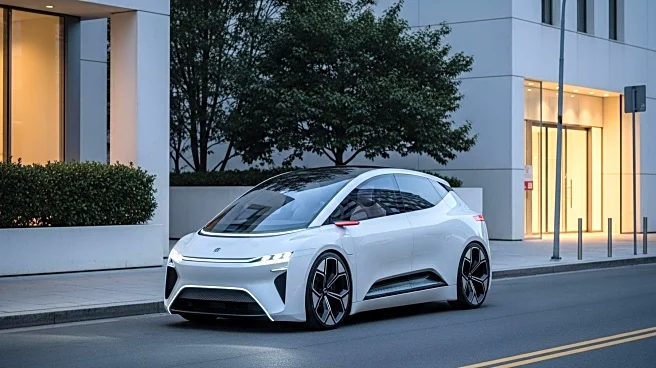What is the story about?
What's Happening?
Zoox, an autonomous vehicle company owned by Amazon, has requested a federal exemption to deploy its custom-built robotaxis commercially. These vehicles are unique as they lack traditional controls such as pedals and steering wheels. The exemption request, known as a '555 exemption,' has been submitted to the National Highway Traffic Safety Administration (NHTSA). Zoox has been working closely with the NHTSA throughout this process. The NHTSA is currently reviewing the application and plans to seek public comment following its initial review. This request follows Zoox's recent milestones, including the launch of a free robotaxi service in Las Vegas and an August exemption allowing demonstrations on public roads. The current application aims to expand the scope beyond research and demonstrations, paving the way for a commercial service.
Why It's Important?
The exemption request by Zoox is significant as it represents a step forward in the commercialization of autonomous vehicle technology. If granted, it could lead to the widespread deployment of robotaxis, potentially transforming urban transportation. This development could impact various stakeholders, including traditional taxi services, ride-sharing companies, and urban planners. The move aligns with broader trends in the transportation industry towards automation and sustainability. It also highlights regulatory challenges in integrating new technologies into existing frameworks. Success for Zoox could encourage other companies to pursue similar exemptions, accelerating innovation in the autonomous vehicle sector.
What's Next?
The NHTSA's review process will determine the next steps for Zoox's exemption request. If approved, Zoox could begin commercial operations, potentially influencing regulatory approaches to autonomous vehicles. Public comments will be sought, which may affect the final decision. Stakeholders such as transportation companies, city officials, and consumer advocacy groups are likely to engage in this process. The outcome could set precedents for future autonomous vehicle deployments, impacting industry standards and consumer acceptance.
Beyond the Headlines
The exemption request raises questions about safety standards and the readiness of infrastructure to support autonomous vehicles. Ethical considerations regarding job displacement in traditional driving roles may arise. Long-term, the integration of robotaxis could influence urban design, reducing the need for parking spaces and altering traffic patterns. The development also touches on privacy concerns related to data collection by autonomous vehicles.

















